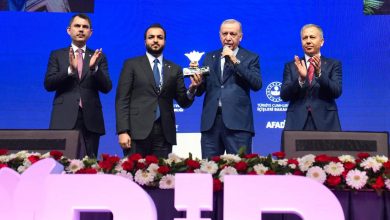UN Secretary-General Stresses Need to Transform Doha Program of Action into Tangible Results
الأمين العام للأمم المتحدة يشدد على ضرورة تحويل برنامج عمل الدوحة إلى نتائج ملموسة
QNA
Doha: HE Secretary-General of the United Nations Antonio Guterres underlined the need to transform Doha Program of Action into tangible results, and to achieve this goal as soon as possible, especially since the world is exposed to unexpected changes.
Addressing the 5th UN Conference on the Least Developed Countries (LDC5) which kicked off in Doha Sunday, HE the UN Secretary-General said that Doha Program of Action (2022-2023) is a practical guide to many issues, because it contains tangible objectives and outputs, such as the facility to support the removal from the least developed countries (LDC) list in a sustainable manner, the investment support center, and a virtual university that has an influential role in achieving sustainable development goals in the least developed countries. He called on the United Nations development partners to support the implementation of this program’s outputs and objectives.
Guterres noted that LDC5 was scheduled to be held in January 2022, but its sudden cancellation due to COVID-19 variant Omicron reminded the world that it is exposed to unexpected changes; citing the outbreak of the war in Ukraine and its devastating effects on the Ukrainian people, and great difficulties facing the least developed countries due to the huge increase in food and energy prices, as well as the global tensions and divisions that are deepening and increasing.
He added that the deeply biased global financial system has clearly wronged the least developed countries as they are trapped in a wave of crises and uncertainty, as well as climate chaos and historical global injustice. These countries are unable to keep pace with the rapid technological changes, and their systems have reached the point of annihilation in health care, education, social protection, infrastructure and job creation.
Unemployment is rising, especially among young people, and women are marginalized.
The UN chief said the least developed countries face interest rates that are 8 times higher than those offered to developed countries, and this matter is only getting worse. In addition, 25% of developing economies spend more than 20% – not on building schools, nor on feeding their people or expanding opportunities for young men and women – rather to bear the costs of debt. He noted that some of these debts increased by more than 35% in the proportions of those costs.
He underlined that the least developed countries need a revolution in the support provided for three main areas. First, the immediate assistance to save the sustainable development goals, because these countries consider these goals as reasons to survive in themselves, such as poverty eradication, health goals, food, clean water and sanitation; as well as an incentive package for sustainable development goals for which the world must stand together and provide at least $500 billion annually for developing countries.
The US Secretary-General added that the time has come for the developed countries to fulfill their obligations towards the least developed countries by providing 0.15 to 0.20 percent of their GDP in the form of development aid, and that the United Nations will not accept excuses.
He pointed to the need to strengthen international efforts to avoid non-payment of taxes, money laundering, and illegal financial flows that drain local resources, noting that while no country or region is immune from these actions, low-income countries lose a lot of tax revenues on these funds, although they need financing and support to achieve structural transformation.
They also need to invest in manufacturing and technological capabilities, infrastructure and transportation networks, and to give women a seat at the decision-making table, the business sector and civil life, as well as investing in education and training in order to produce a qualified workforce that strengthens their institutions.
Guterres said that the second major area in which the least developed countries need support is the reform of the global financial system. International financial institutions must devise ways to provide financing when it is needed most. This includes expanding reserve financing and incorporating catastrophe and pandemic clauses into lending instruments and clauses. It is also time to accelerate the reallocation of Special Drawing Rights from richer countries to those that need help the most, and to create greater flows of private financing at an affordable cost to developing countries, especially the least developed ones. He noted the importance of finding new and innovative ways to measure the economies of countries that go beyond just calculating the gross domestic product.
The third and final area, according to Guterres, is that the least developed countries must revolutionize climate action because they produce less than 4% of greenhouse gas emissions, and it is a disaster that 7 out of every 10 deaths due to greenhouse gases occur in these countries. He emphasized that the developed countries must strengthen their support for the least developed countries, help them adapt, increase their ability to withstand climate change and move more smoothly to renewable energy sources. Developed countries must also fulfill their promises to provide $100 billion for developing countries, and simplify access to financing to take the required climate measures, as well as facilitating access to the Compensation Fund for Loss and Damage, strengthening the financing of adaptation efforts to double, striving to achieve higher equality for this fund, and supporting the development of early warning systems in the next five years for all countries of the world.
The US Secretary-General called for concluding a climate cooperation agreement, providing financial and technical support to ensure the transition of emerging economies to renewable energy sources, and maintaining the goal of keeping the planet’s temperature increase below 1.5 degrees, stressing it is time to end the “empty promises” era and to give enough attention to the needs of the least developed countries, which must be at the heart of projects, priorities and investments.
قنا
الدوحة: شدد سعادة السيد أنطونيو غوتيريش الأمين العام للأمم المتحدة، على ضرورة تحويل برنامج عمل الدوحة إلى نتائج ملموسة، والالتفاف حول هذا الهدف وبأسرع وقت ممكن خاصة وأن العالم معرض لمتغيرات غير متوقعة.
وأكد سعادته في كلمته أمام مؤتمر الأمم المتحدة الخامس المعني بأقل البلدان نموا الذي انطلق اليوم بالدوحة، أن برنامج عمل الدوحة /2022 – 2031 / دليل عملي للعديد من القضايا فهو يحتوي على أهداف ومخرجات ملموسة كالمرفق المستدام لإزالة أسماء الدول عن قائمة البلدان الأقل نموا، ومركز دعم الاستثمار، وجامعة افتراضية لها أن تلعب دورا مؤثرا في أهداف التنمية المستدامة في الدول الأقل نموا.. داعيا شركاء الأمم المتحدة في التنمية لدعم تنفيذ مخرجات هذا البرنامج وأهدافه.
وأوضح غوتيريش أن هذا المؤتمر كان من المفترض أن يعقد في يناير من العام الماضي، لكن إلغاءه المفاجئ بسبب موجة أوميكرون من فيروس كورونا /كوفيد 19 /، جاء ليذكرنا بأن العالم معرض لمتغيرات غير متوقعة.. مستدلا على ذلك باندلاع الحرب في أوكرانيا وآثارها المدمرة على الشعب الأوكراني، والبلدان الأقل نموا التي تواجه صعوبات كبيرة بسبب الطفرة في أسعار الغذاء والطاقة، وكذلك التوترات العالمية والانقسامات التي تتعمق وتتزايد.
وأضاف أن النظام المالي العالمي المنحاز انحيازا عميقا، قد ظلم الدول الأقل نموا ظلما واضحا فالدول الأقل نموا عالقة في موجة من الأزمات وانعدام اليقين، والفوضى المناخية والظلم العالمي التاريخي، وهي غير قادرة على اللحاق بالتغيرات التكنولوجية السريعة، وأن نظمها قد وصلت إلى حد الفناء سواء في الرعاية الصحية والتعليم والحماية الاجتماعية والبنى التحتية وخلق الوظائف، فالبطالة ترتفع وخاصة بين الشباب، والمرأة تهمش.
وبين الأمين العام للأمم المتحدة، أن الدول الأقل نموا تواجه نسب فائدة تفوق بـ8 مرات تلك المقدمة للدول المتقدمة وهذا الأمر لا يزداد إلا سوءا، كما أن 25 بالمئة من الاقتصادات النامية تنفق أكثر من 20 بالمئة ليس على بناء المدارس، ولا على إطعام شعبها، ولا على توسيع الفرص المتاحة بين الشاب والفتاة، بل لتوفير وتحمل تكاليف الديون، مشيرا إلى أن بعض هذه الديون شهدت زيادة تفوق 35 بالمئة في نسب تلك التكاليف.
وأكد أن الدول الأقل نموا بحاجة إلى ثورة في الدعم المقدم لثلاثة مجالات رئيسية، أولا: المساعدة الفورية لإنقاذ أهداف التنمية المستدامة لأن هذه الدول تعتبر هذه الأهداف غاية بقاء بحد ذاتها كالقضاء على الفقر وأهداف الصحة والغذاء والمياه النظيفة والصرف الصحي، وكذلك تقديم حزمة حوافز لأهداف التنمية المستدامة ليلتف العالم حولها وليوفر 500 مليار دولار على الأقل سنويا للدول النامية.
وتابع الأمين العام للأمم المتحدة بأنه آن الأوان لتنفذ الدول المتقدمة التزاماتها نحو الدول الأقل نموا بتوفير 0.15 إلى 0.20 من نسبة ناتجها المحلي في شكل مساعدات إنمائية وأن الأمم المتحدة لن تقبل الأعذار.. منبها إلى ضرورة تعزيز الجهود الدولية لتفادي عدم دفع الضرائب، وغسيل الأموال، والتدفقات المالية غير المشروعة التي تستنزف المصادر المحلية، وبالرغم من أنه ما من دولة أو منطقة في منأى عن هذه الأفعال إلا أن الدول ذات الدخل الأقل تفقد الكثير من عوائد الضرائب على هذه الأموال، رغم أنها بحاجة إلى التمويل والدعم لتحقيق تحول هيكلي كما أنها بحاجة إلى الاستثمار في القدرات التصنيعية والتكنولوجية والبنى التحتية وشبكات النقل، وإعطاء المرأة مقعدا على مائدة صنع القرار وقطاع الأعمال والحياة المدنية والاستثمار في التعليم والتدريب لتخرج بقوى عاملة مؤهلة تعزز مؤسساتها.
وأضاف سعادة السيد غوتيريش أن المجال الرئيسي الثاني الذي تحتاج البلدان الأقل نموا إلى الدعم فيه هو إصلاح النظام المالي العالمي فعلى المؤسسات المالية الدولية ابتكار السبل لتوفير التمويل حين تتعاظم الحاجة إليه، وهذا يشتمل على توسيع التمويل الاحتياطي وإدماج شروط بشأن الكوارث والجوائح في صكوك وبنود الإقراض، فقد آن الأوان أيضا لتسريع إعادة تخصيص حقوق السحب الخاصة من الدول الأكثر ثراء إلى الدول التي تحتاج مساعدة أكثر من غيرها، وأن تخلق تدفقات أعظم من التمويل من القطاع الخاص بتكلفة معقولة للدول النامية وخاصة الأقل نموا، منوها بأهمية إيجاد سبل جديدة ومبتكرة لقياس اقتصادات الدول تتعدى مجرد حساب إجمالي الناتج المحلي.
أما المجال الثالث والأخير فهو أن الدول الأقل نموا عليها أن تحدث ثورة لدعم العمل المناخي لأنها تنتج أقل من 4 بالمئة من انبعاثات الغازات الدفيئة ومن الكارثة أن 7 من كل 10 وفيات بسبب الغازات الدفيئة تحدث في هذه الدول، مشددا على أن الدول المتقدمة عليها تعزيز دعمها للدول الأقل نموا ومساعدتها على التكيف وزيادة قدرتها على الصمود في مواجهة تغير المناخ والانتقال بشكل أكثر سلاسة لمصادر الطاقة المتجددة كما أن على الدول المتقدمة أن تفي بوعودها بتوفير 100 مليار دولار لصالح الدول النامية، وتبسيط الاستفادة من التمويل لاتخاذ الإجراءات المناخية المطلوبة، وكذلك تسهيل الوصول إلى صندوق التعويض عن الخسارة والضرر وتعزيز تمويل جهود التكيف إلى الضعف والسعي لتحقيق مساواة أعلى لهذا الصندوق ودعم استحداث نظم إنذار مبكر في السنوات الخمس المقبلة لكل دول العالم.
ودعا الأمين العام للأمم المتحدة في ختام كلمته إلى عقد اتفاق للتعاضد المناخي، وتوفير الدعم المالي والفني لضمان تحول الاقتصادات الناشئة إلى مصادر الطاقة المتجددة، والاحتفاظ بهدف إبقاء زيادة درجة حرارة الكوكب أقل من 1.5 درجة فقد حان الوقت لإنهاء زمن “الوعود الفارغة” وإعطاء وإيلاء الاهتمام الكافي لاحتياجات الدول الأقل نموا التي تقع في صلب مشاريعنا وأولوياتنا واستثماراتنا.




